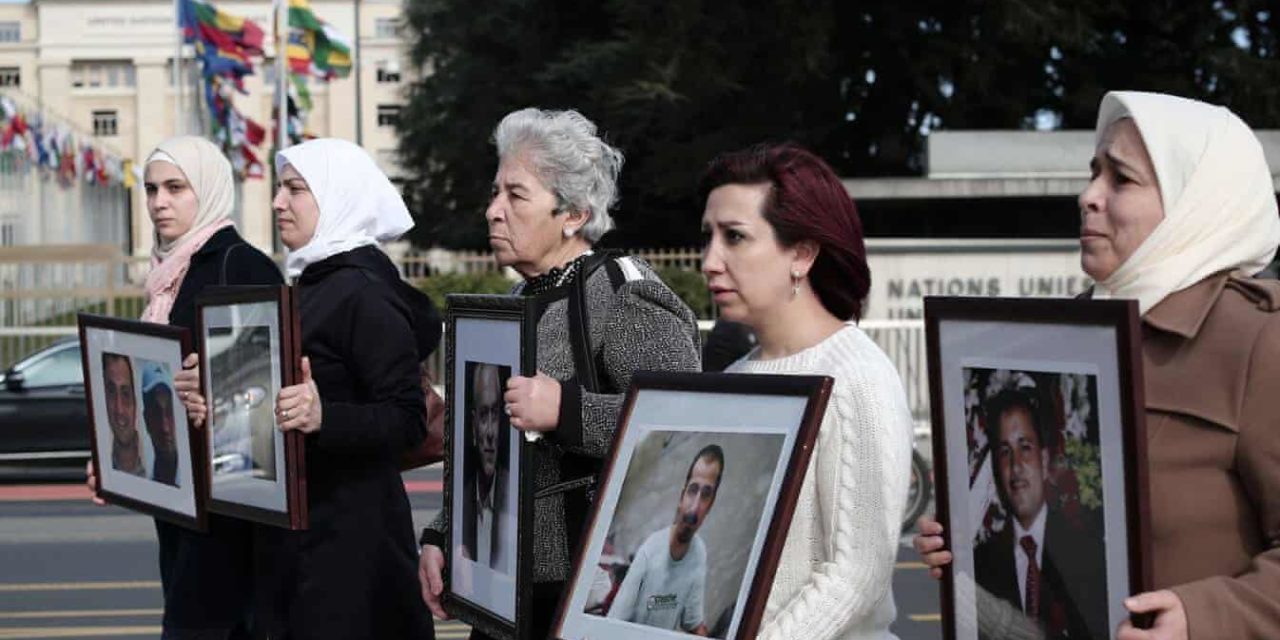“Soon we will not need to continue watching the horrors of the war….The terror of the Syrian state will once again be perpetrated out of view.”
Elizabeth Tsurkov writes for Syria Source:
Over recent weeks, as the Syrian regime updated its civil registries across the country, hundreds of families discovered that their relatives died in detention. Tens of thousands of Syrians were arrested in the early years of the uprising and their families continued to hold on to hope that they were still alive. Syrian human rights organizations documented a significant rise in the number of updates to the civil registry in the past two months; which is ongoing. The cause of death is not mentioned, but it is clear that detainees largely died under torture or were executed.
As opposed to the first years of the uprising — when relatives would receive the bodies of relatives bearing marks of torture — today Syrians receive only a piece of paper informing them of their relatives’ death. The crematorium that is apparently operating at Sednaya prison and the large mass graves dug up near other detention facilities ensure that families have nothing to bury. The wave of death notifications serves as a stark reminder for the mode of operation of the Syrian police state in the decades that preceded the uprising, and offer a glimpse into Syria’s future under Assad, after the end of the war.
“Barrier of Fear”
Conversations with residents of territories once controlled by the rebels that have been reconquered by the regime indicate the full restoration of the “barrier of fear” that Syrian protesters shattered in 2011. My interlocutors, who would once speak freely, now censor themselves, fearing that the regime is monitoring their private communications. Some tell me that “everything is fine,” while others admit that reality is far from it. Many Syrians in these areas deleted their Facebook profiles or erased any sign of opposition to the regime from their accounts. Some even cut off ties with relatives and friends who choose to be displaced to rebel-held areas rather than surrender to the regime.
Members of communities who decide to remain in their homes during the takeover of their towns and villages by the regime are under constant surveillance. The Syrian Army and allied militias are looting home appliances, domesticated animals, and even tearing out copper wiring; all common practices used throughout the conflict after areas surrendered to the regime. Locals rarely dare to complain. The secret police and the army are carrying out arrests of suspected regime opponents again. Neighbors observe what is happening and remain silent. The brave among them tell journalists and exiled regime opponents.
My family in Syria and my friends there prefer to use encrypted chats to share the real thoughts. Otherwise, on phone they sound very happy and even invited me to come to see how calm is. Nobody believes in the bright Assadist future.
— Ruslan Trad (@ruslantrad) August 30, 2018
Since 2011, I rarely encountered difficulties finding Syrian eyewitnesses who would be willing to speak about human rights violations they had observed. Syrian citizens risked their lives to document protests that were met with live ammunition, and later regime and Russian airstrikes, chemical attacks, and other crimes. During the offensive on southern Syria, as I tried to gather details about a massacre that occurred in a town in Daraa, for the first time I encountered a refusal by multiple eyewitnesses to report on what they experienced. Some of them knew that they would soon surrender to the regime and did not want to get into trouble. Others gave up hope on the ability of human rights organization to impact the conflict.
Instead of living under constant fear of indiscriminate airstrikes, Syrians who now live under regime-controlled areas, are under the constant fear of arrest and torture; in particular those who lived for years under rebel-control and are suspected of sympathies for the opposition. While the strikes of the Syrian and Russian air-forces were indiscriminate and only escape from rebel-held areas provided safety, residents of regime-held Syria try to avoid arrest by displaying loyalty to the regime. This fear explains why thousands of southern Syrian towns took part in the victory celebrations organized by a regime that devastated their towns and killed their loved ones.
The terror inflicted by the Syrian state, which was overt and well-documented during the years of the civil war, is returning to its previous silent incarnation; that of disappearances and torture chambers. Instead of disfigured corpses blown up by airstrikes, homes catching fire as a result of incendiary weapons, children quivering after inhaling chemical weapons, Syria is reverting to the clean and bureaucratic patterns of violence: detentions, disappearances, and death notifications. The international community can breathe a sigh of relief. Soon enough we will not need to continue watching the horrors of the war raging in Syria and feel guilty and helpless. The terror of the Syrian state will once again be perpetrated out of view.

